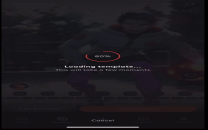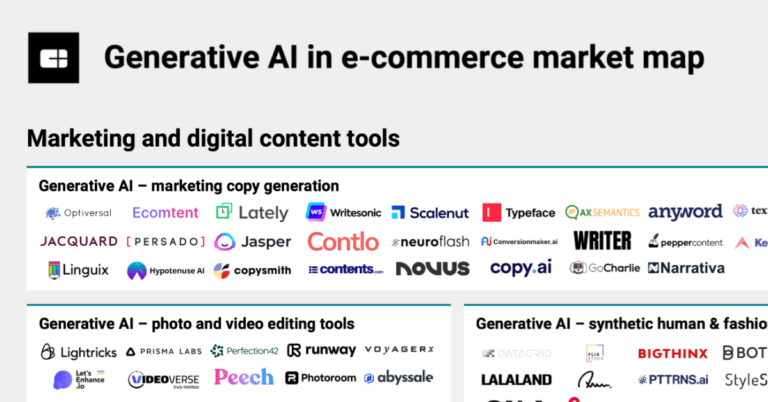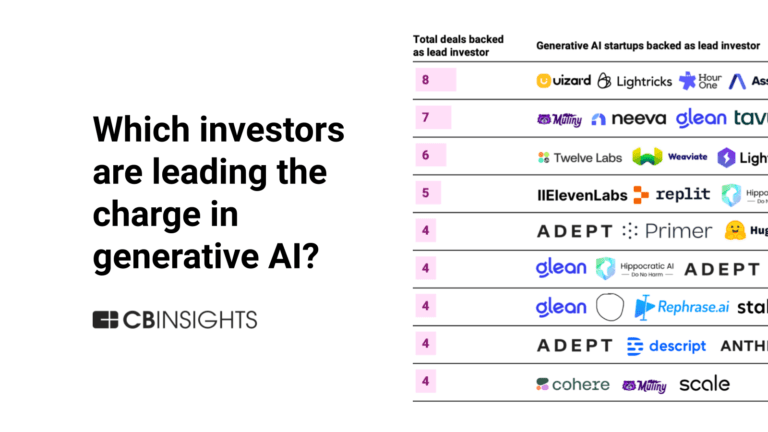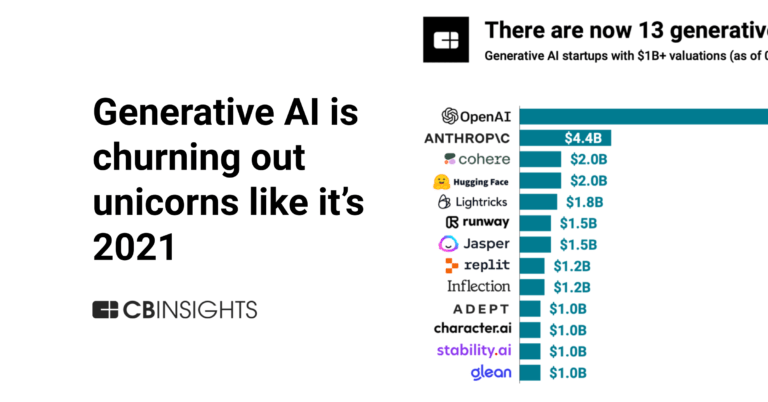
Lightricks
Founded Year
2013Stage
Angel | AliveTotal Raised
$335MRevenue
$0000About Lightricks
Lightricks is an AI-first company focused on visual content creation in the creative and business sectors. The company offers applications and platforms that utilize AI photo and video generation models to provide editing tools and marketing solutions. Lightricks serves the content creation and influencer marketing industries. It was founded in 2013 and is based in Jerusalem, Israel.
Loading...
Lightricks's Product Videos


ESPs containing Lightricks
The ESP matrix leverages data and analyst insight to identify and rank leading companies in a given technology landscape.
The generative AI — photo & video tools market provides software that uses machine learning algorithms to automate and enhance image and video creation and editing. Companies in this market offer solutions that automatically generate visual content, enhance image quality, restore details, remove backgrounds, correct colors, and process media significantly faster than traditional methods. These too…
Lightricks named as Challenger among 15 other companies, including Canva, Synthesia, and Stability AI.
Lightricks's Products & Differentiators
Facetune
An image and portrait editing toolkit for content creators of all kinds. Facetune helps user edit their photos flawlessly to express themselves and share their content with confidence.
Loading...
Research containing Lightricks
Get data-driven expert analysis from the CB Insights Intelligence Unit.
CB Insights Intelligence Analysts have mentioned Lightricks in 4 CB Insights research briefs, most recently on Nov 3, 2025.

Nov 3, 2025 report
Tech IPO Pipeline 2026: Book of Scouting Reports
Oct 17, 2024
The generative AI for e-commerce market mapExpert Collections containing Lightricks
Expert Collections are analyst-curated lists that highlight the companies you need to know in the most important technology spaces.
Lightricks is included in 6 Expert Collections, including AR/VR.
AR/VR
1,509 items
This collection includes companies creating hardware and/or software for augmented reality, virtual reality, and mixed reality applications.
Unicorns- Billion Dollar Startups
1,297 items
Artificial Intelligence (AI)
25,778 items
Companies developing artificial intelligence solutions, including cross-industry applications, industry-specific products, and AI infrastructure solutions.
Digital Content & Synthetic Media
2,287 items
The Synthetic Media collection includes companies that use artificial intelligence to generate, edit, or enable digital content under all forms, including images, videos, audio, and text, among others.
Influencer & Content Creator Tech
340 items
Companies that serve independent creators who want to monetize their own work, from content creation tools to administrative back-end platforms to financing solutions.
Generative AI
2,951 items
Companies working on generative AI applications and infrastructure.
Lightricks Patents
Lightricks has filed 1 patent.
The 3 most popular patent topics include:
- audio engineering
- broadcast engineering
- continuous distributions

Application Date | Grant Date | Title | Related Topics | Status |
|---|---|---|---|---|
6/29/2020 | 8/31/2021 | Continuous distributions, Video signal, Broadcast engineering, Audio engineering, Video formats | Grant |
Application Date | 6/29/2020 |
|---|---|
Grant Date | 8/31/2021 |
Title | |
Related Topics | Continuous distributions, Video signal, Broadcast engineering, Audio engineering, Video formats |
Status | Grant |
Latest Lightricks News
Nov 2, 2025
When the micro-series trend became popular in China during the Covid pandemic, with millions of young people, mainly women, drawn to watching romantic, horror, and crime series on their phones, few in the West noticed. But when quarterly revenue from micro-series jumped from a few million dollars at the end of 2023 to almost $700 million in the first quarter of 2025, when Chinese apps spread throughout East Asia and even reached the US, and when micro-drama revenue surpassed revenue from Chinese theaters - it became difficult to ignore. Venture capitalists, television producers and gaming entrepreneurs realized that an industry unlike any other had been growing under their noses. Micro-series comprise dozens of short episodes, each up to two minutes long, that end in a dramatic moment, compelling curious users to put their hand in their pocket and pay to watch the next episodes This is not just another television format, but rather addictive apps that tap into the emotional glands that are activated when playing computer games, rather than when watching Netflix-style streaming services. This is how it happened that at a relatively early stage the trend was discovered by Israeli entrepreneurs, most of them from the gaming field - companies like Google, Playtika and SciPlay. In China and India, micro-series have become so popular that they are produced in all the main genres, but in the West they are still centered around the immediate audience of mobile games: women aged 25-44 who mainly consume romantic dramas or true crime series revolving around romantic themes. Gaming producers and entrepreneurs in Israel are seizing the opportunity At least three companies in the micro-series sector have been founded in the past year by Israeli entrepreneurs - only one of which has come out of stealth so far - the GammaTime app by Israel's Slava Mudrykh, former head of mobile games at Google Israel, and super producer Bill Block, the legendary CEO of Miramax. The company raised $14 million last month with investment from Kim Kardashian, her mother Kris Jenner, and Israel's Pitango First and vgames venture capital funds. A few days ago, its Gamma app was officially released, featuring original series produced by the company, mainly in popular genres in a vertical format: English-language soaps, true crime stories and romantic dramas. The most popular of them: a thriller drama by CSI creator Anthony Zuiker, called "Lust Cop", a thriller about a policewoman hunting a sexual predator; the series "Vengeance Affair", which depicts an affair that became complicated between a gallery owner and a married man; and the true-crime series "The Temptress," about a series of mysterious murders of men. Another Israeli app that has hit stores and is also growing in the US is Shortical, by serial gaming entrepreneur Guy Shimoni and his partner Yigal Rosen. The company, which still operates under the media radar and did not respond to Globes' inquiries, launched the app last summer, and offers original weries from various genres, such as westerns "Keys to My Heart," "Hospitals," and "Pulse of Love", and an unusual array of romantic series depicting love stories with young billionaires, which include intrigue and scheming. Israeli producer Yoav Gross, who has made popular series such as "Manayek," "Ahad Ha'am 1," "The Good Cop" and "The Eighties," is also entering the picture with a new app that will be launched in the coming months called Appreel - bringing with him a management team that includes Eyal Topper, a former senior executive at the video advertising engine Primis, his former partner in the production company Osher Asulin, and content executives such as Ron Yavorsky and Shay Meghnagi. Another surprising Israeli player on the market is Jerusalem-based Lightricks, developer of the photo editing app FaceTune and manufacturer of the popular video model LTX. The company allows the creation of 4K quality videos and 20 seconds in length at a tenth of the price offered by competitor OpenAI, while Google's competing technology (Veo3) allows the creation of up to 10 seconds. According to estimates, its technology is already in use by several foreign drama apps. Although most series still star real actors, the trend that Lightricks is leading, along with cheaper production costs, is the planning of series that are produced from A to Z using AI. "It was clear to me that something huge is happening here" "The first time I came across the field was in early 2024, when I was looking outside the gaming world in an attempt to identify which categories and apps were starting to grow," Mudrykh, who left his job at Google to found Gametime, tells Globes. "I expected to see mainly AI apps, but I was surprised to discover a completely different category: micro-dramas. Suddenly, out of China, a new field grew at an unimaginable pace. It was clear to me that something huge was happening here. "Such growth, both in usage data and in revenue, is very rarely seen. I checked the numbers over the course of a year, and I couldn't believe the speed of growth. What surprised me most was the fact that the only players in the market then, and to a large extent even today, are Chinese, while most of their revenue comes from the US market." According to Mudrykh this is one of the only categories in which Western money flows to the East unilaterally, without any real local competition. "If TikTok is rivalled by YouTube and Instagram, and by Chinese drama apps like ReelShort and DramaBox, the playing field in the US was almost empty, with the entertainment market mostly dominated by Hollywood content. While in the world of mobile gaming, games from the East are mainly successful in the East and American, European and Israeli companies are successful in the West - here the opposite situation has been created, in which the East is completely sending the West in the short-form content market. And once you understand this, it's clear that there is a massive window of opportunity here." Alongside the Israeli and Chinese apps, the Ukrainian app MyDrama by HolyWater has become the leader in the micro-drama market in the US and Europe, and has even signed a distribution agreement with the US TV network. New apps are also growing in the US, such as NetShort, which launched in July 2024, and FlareFlow, which only came to market last April. Both of them alone are already ranked among the top 20 entertainment apps in the US. Will there be room for them all? Most of the apps are quite similar: they offer a similar viewing experience with content focused on romantic soaps and are aimed at the same segments of the young female population. The business model is drawn from the world of casual gaming It is no coincidence that this market appeals to people from the gaming world. Although at first glance the experience looks like a streaming app, the principles that guide the viewing habits and the economic model of these apps comes from the world of casual gaming, and are what make it profitable. Instead of accessing content in exchange for a monthly or annual subscription, in micro-series there is no need to register, enter an email or credit card, or pay in advance - viewing is done immediately and for free up to a limited number of episodes, usually ten. After that, you can watch ads, accumulate coins by watching or waiting, or buy a coin pack to unlock the option of watching additional episodes. Some apps, such as Shortical, also allow paid subscriptions for a week (NIS 70) or a year (NIS 700). The average consumer spends about half a dollar on one episode and on average between $20-30 for an entire series. Consumption patterns also resemble casual games more than streaming series with 45-minute episodes. These are short sessions of one, two or five minutes consumed in "dead" moments, while waiting for the train, during a meal break, before going to bed and even in the bathroom and are in line with the increasingly short attention spans and addiction to vertical formats. Investors are very satisfied with the cost of user acquisition - usually the heaviest expense item in gaming companies, where "hundreds of thousands of games compete for the same attention. It's a mature industry where costs have risen steadily over the years," explains Mudrykh. "In contrast, the micro-drama sector is new and growing and also has much better conversion rates. We advertise dramatic moments from a series - a strong scene, an open question, an emotional conflict. It's an ad that tells a story, and the user's natural reaction is simply: ‘I want to know how it ends.' That creates excellent conversion rates." While most apps in the industry were founded by gaming people, producer Yoav Gross, founder of the drama app Appreel, believes that those led by entrepreneurs from the production world are also important. "As someone who has been producing series in Israel for 30 years, we know how to produce a series with a budget of $30,000 and have it look like it was produced for $300,000," he tells Globes. This is an advantage for Israelis, "who are used to producing content on a low budget," he says, "while competitors produce them on a budget that can be ten times that, and the result will look similar." The business model, according to Gross, has a lot to learn from media companies: "We can sell a license for such micro-series for a year, then bring the content back to us and rebrand it. We plan to produce between 800 and 1,000 series a year, so that we can have about 4,000 series that we can use in different ways or sell." Daniel Shinar, a founding partner and CEO at the Claltech venture capital fund and a writer who also created the television series "Red Sky," says, "As long as these companies continue to grow by thousands of percent a year, also in terms of profitability, this will be a legitimate investment that can bring good returns." There are quite a few unanswered questions regarding the success of the field, says Shinar, "such as whether these companies will be able to move beyond the romance genre into other genres, whether this is a passing trend or one that will become a permanent form of content consumption like YouTube or even Netflix, whether the companies will be able to continue to acquire users at low prices or will the density of the number of companies increase advertising prices, and whether content produced by AI will be accepted as a real replacement for human actors." Shinar adds that there are also interesting cultural questions: "There are trends that came from the East that have not been so well received in the West - such as shopping from streaming, so the uncertainty is still great, but I believe that in the long run people will always be willing to pay for better products. Therefore, I believe that these platforms will enter more mainstream content, while the streaming platforms that challenged linear television will be challenged themselves and will have to adapt to the new era." The idea failed in the past, so what's different this time? If the idea of a short-form series sounds familiar, it's because it has been tried unsuccessfully before, when in 2020, super producer Jeffrey Katzenberg and former eBay CEO Meg Whitman shut down the short-form video service Quibi after raising $1.75 billion, returning only part of it to investors. One explanation for the failure was unfortunate timing - short-form videos are content consumed on the way to work or during breaks - while during the Covid lockdown, viewers were looking for longer, more meaningful content. "The world has changed since the fall of Quibi," says Daniel Mironov, a partner at vgames, which manages the investment in GammaTime. "Short-form content has grown on all platforms since then, and companies already come with solid knowledge of performance measurement and costs. Content production is also cheaper and profitability is at the heart of the business. The use of short drama is only increasing, but of course, in the end not all companies will win because of the tough competition." But will Meta and YouTube break the market when they decide to enter it too? "I don't see how these companies are entering the content space," says Mironov. "They have been choosing to remain a platform for years. However, it is possible that some content creators will try to bring their own content to the big platforms." Published by Globes, Israel business news - en.globes.co.il - on November 3, 2025. © Copyright of Globes Publisher Itonut (1983) Ltd., 2025.
Lightricks Frequently Asked Questions (FAQ)
When was Lightricks founded?
Lightricks was founded in 2013.
Where is Lightricks's headquarters?
Lightricks's headquarters is located at Professor Racah Street, Jerusalem.
What is Lightricks's latest funding round?
Lightricks's latest funding round is Angel.
How much did Lightricks raise?
Lightricks raised a total of $335M.
Who are the investors of Lightricks?
Investors of Lightricks include Marc D'Amelio, Charli D'Amelio, Dixie D'Amelio, Heidi D'Amelio, Insight Partners and 18 more.
Who are Lightricks's competitors?
Competitors of Lightricks include Bending Spoons, Bria, Runway, Crisalix, Lightning AI and 7 more.
What products does Lightricks offer?
Lightricks's products include Facetune and 3 more.
Loading...
Compare Lightricks to Competitors
Alpaca focuses on the intersection of artificial intelligence and art and operates within the technology and creative industries. The company offers a suite of AI tools designed to assist artists in their creative process, enabling them to generate images, refine concepts, and experiment with style and composition. Alpaca primarily serves the creative industry, particularly artists and designers. It is based in Montreal, Canada.

FaceApp is a company that focuses on digital technology, specifically in the photo editing industry. The company offers a photo editing application that uses artificial intelligence to provide a variety of filters, effects, and tools that can transform portrait photos into magazine cover quality images. The application primarily caters to individual users who are interested in photo editing and enhancement. It was founded in 2017 and is based in Limassol, Cyprus.

Topaz Labs develops software for photo and video editing. The company offers tools for denoising, sharpening, and upscaling images, as well as stabilizing and processing video content. Topaz Labs' products are used by photographers and videographers, including professionals in the tech, entertainment, and aerospace sectors. It was founded in 2006 and is based in Addison, Texas.

Reface specializes in AI-powered content creation tools within the technology sector. Its main offerings include an AI face swap app, image and video style transformation, and photo animation services, all designed to simplify and enhance the user experience in content creation. The company primarily serves the entertainment and content creation industries. It was founded in 2019 and is based in Wilmington, Delaware.

Bria specializes in visual generative artificial intelligence (AI) solutions for commercial use across different sectors. The company offers a platform for AI image generation and editing, tailored to the needs of businesses and developers. Its services include foundation models, source-available models, and a suite of application programming interfaces designed for applications, with a focus on helping organizations build and deploy AI solutions. It was founded in 2020 and is based in Tel Aviv, Israel.

EmbodyMe is a company that specializes in technology within the visual content creation and enhancement industry. They provide products that facilitate the generation and control of visual elements in images and videos, using deep learning. Their services are applicable to sectors such as video conferencing, live streaming, video production, advertising, and gaming. EmbodyMe was formerly known as Paneo. It was founded in 2016 and is based in Tokyo, Japan.
Loading...


